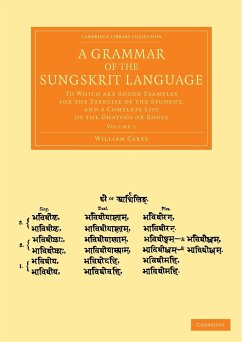The Indo-Aryan language of Sanskrit is the primary language of Hinduism and also a scholarly language of Buddhism. Dating back to the second millennium BCE, it is considered to be the parent of most modern languages of India, and remains central to work in Indo-European studies, philology and linguistics today. First published in 1806, this is a comprehensive grammar of Sanskrit, compiled by the Baptist missionary William Carey (1761-1834) during his time in India. Its purpose was to make the language accessible to European learners, presenting its complex systems of verb conjugation, compound words and affixation in a straightforward way. Reissued here in a two-volume set, Volume 1 contains Books 1-3 of the work, covering characters, pronouns and verbs, and clearly laying out the rules of their formation by way of numerous illustrative examples. Carey's reference works on Marathi and Bengali are also reissued in this series.
Bitte wählen Sie Ihr Anliegen aus.
Rechnungen
Retourenschein anfordern
Bestellstatus
Storno


